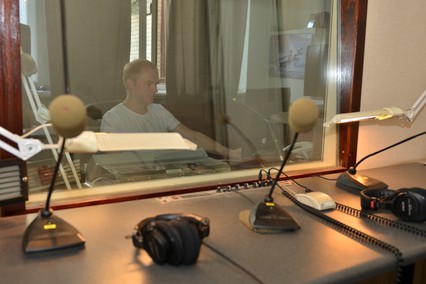Description
Generally sound engineers or technicians who work in the broadcasting industry are the skilled professionals who make films, TV shows and music videos sound amazing. Essentially, these guys use technical equipment to record sound, amplify voices and edit recordings. They also set up, operate, and maintain the electronic equipment used to transmit radio and television programs. Control audio equipment to regulate volume level and quality of sound during radio and television broadcasts. Sound engineers work in a variety of different areas, from television advertisements and television panel shows to feature films and sporting events that are covered on live TV. Some professionals work specifically at News department on radio or TV channel.
2. Consulting with producers and performers to determine the sound requirements
3. Selecting, positioning, adjusting and operating the equipment used for amplification and recording
4. Applying technical knowledge of sound recording equipment to achieve the determined artistic objectives
5. Recording sound onto digital audio tape or hard disk recorders
6. Monitoring audio signals to detect sound-quality deviations or malfunctions
7. Anticipating and correcting any problems
8. Maintaining and repairing sound equipment
9. Integrating (synchronisation) of pre-recorded audio (dialogue, sound effects and music) with visual content
10. Re-recording and synchronising audio (post-synching)
11. Mixing and balancing speech, effects and music
12. Creating and altering sound effects for use in films, television, etc.
United States of America: $56,610 per year
Australia: AU$40,000 - AU$65,000 per year
Tasks:
1. Assessing the acoustics of the performance area and assembling and operating the necessary equipment2. Consulting with producers and performers to determine the sound requirements
3. Selecting, positioning, adjusting and operating the equipment used for amplification and recording
4. Applying technical knowledge of sound recording equipment to achieve the determined artistic objectives
5. Recording sound onto digital audio tape or hard disk recorders
6. Monitoring audio signals to detect sound-quality deviations or malfunctions
7. Anticipating and correcting any problems
8. Maintaining and repairing sound equipment
9. Integrating (synchronisation) of pre-recorded audio (dialogue, sound effects and music) with visual content
10. Re-recording and synchronising audio (post-synching)
11. Mixing and balancing speech, effects and music
12. Creating and altering sound effects for use in films, television, etc.
Key skills for Sound Engineer, News Service:
- Excellent aural skills
- Scrupulous attention to detail
- General technical ability, dexterity and agility
- Good sense of timing and swift reactions
Average Salary (2013):
United Kingdom: £16,000 - £18,000 per yearUnited States of America: $56,610 per year
Australia: AU$40,000 - AU$65,000 per year
Qualifications and training required:
Although this area of work is open to all graduates, a successful candidate will need to show a good understanding of the physics of sound, technical aptitude (including an awareness of current sound technology and equipment), good aural skills, excellent communication skills and acute attention to detail.A good general education will be useful. High levels in maths and physics and qualifications in electronics will be particularly beneficial. The following subjects may increase your chances of success: music/sound technology; sound engineering; media technology and/or production; technical theatre.
Practical experience is usually a pre-requisite to securing work as a sound engineer. There are a range of places where you can volunteer, including: a recording or editing studio; student or community/hospital-based film or radio project; doing the rigging and sound for amateur theatre or local musicians; working for equipment manufacturers.Companies in profession
Best students in profession
Professions you might be interested in
Virtual internship
In our portal we are using cookies. Using the portal, you agree to the use of cookies. You can find out more!
Accept


